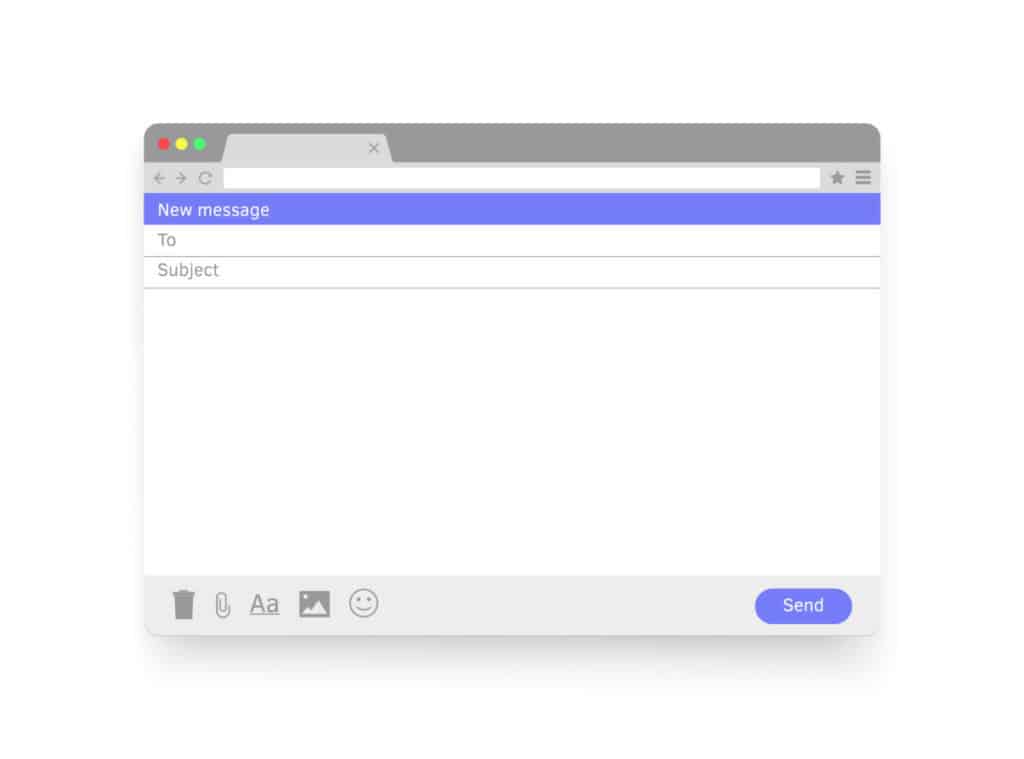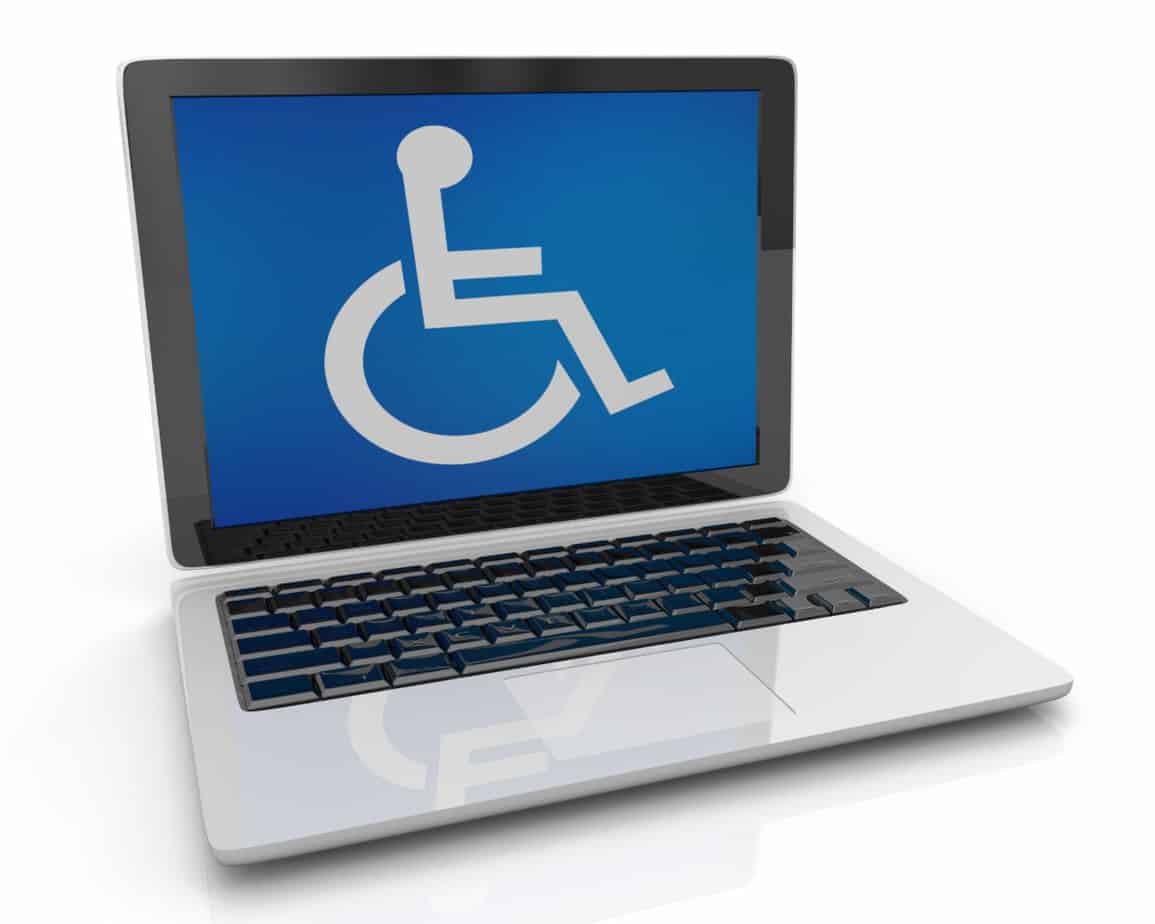Instructors are required to provide reasonable disability accommodations by law, but we all know that how willing a professor is to work with you can vary widely. This can be a huge area of concern when starting a course with a new professor.
The number one thing that I have found that helps start the semester off on the right foot is to email your professor about your disability accommodations right away.
Emailing your professors right away shows that you are proactive about being successful in their course.
In your email to your professors about your disability accommodations, you want to be professional. Introduce yourself, show an interest in their course and a desire to do well, briefly tell them about your health issues, and discuss what accommodations you may need to succeed in their course.
In this post, I will share why you need to email your professor, proper email etiquette, how much health information you need to disclose, and all the tips that I have learned about how to email professors about disability accommodations from my years of emailing my professors.
Click hereto check out the most popular books on disability accommodations.
Why email your professor about your accommodations?
Emailing a professor is required for online students, but I would still recommend emailing even if you are an in-person student.
Email your professor before the first class to introduce yourself and demonstrate that you are a self-advocate who is committed to succeeding in their class. It also opens up a line of communication before any issues arise.
If problems with your professor arise later (hopefully, they don’t!), it is helpful to be able to show that you were in communication with them about your disability and needs from the start. You have a record of this communication (the emails).
The disability office expects you to be proactive about communicating with your instructors.
Make sure that you send a separate personalized email to each of your professors!
Check out all the benefits of Prime Student. Click here
to sign up for Prime Student.
Proper etiquette for an email to a professor
When writing to a professor, it is proper to use your school email address, avoid texting language, use a professional tone, and be clear and concise. Make sure you include a subject line, introduction, and greeting/closing salutations.
Let’s look at these tips more in-depth:
Use your school email address (that ends in .edu)!
This will help you avoid ending up in the Spam folder and makes your professor more likely to answer.
Do not use texting language!
This sets a terrible first impression in an academic setting.
Use a professional tone.
You need to be polite and make requests instead of demands.
Keep your email short and to the point.
Refer to your professor how they refer to themselves or as “Professor.”
You should check how your professor refers to themselves in the syllabus. If they refer to themselves as Dr., then it is best to address them as Dr. _________. If they don’t refer to themselves with a specific title, it is best to refer to them as “Professor.”
This is always appropriate and gender-neutral. Plus, it avoids the Ms./Mrs. can of worms!
Don’t be informal enough to call them by their first name (even if they are the “cool” professor who says that you can).
Include the necessary parts of any email to a professor:
- A clear subject line that includes your course and section number
- Greeting salutation, such as “Dear Professor Johnson,” or “Hello Professor Johnson,”
- Introduction that includes your full name and course and section number
- Pleasantries and body of the email (discussed below).
- Thank them for their time.
- Closing salutation, such as “Much appreciated,” or “Sincerely,”
Edit to make sure it makes sense and to avoid spelling and grammar errors.
This takes a couple of minutes at most and ensures your email is professional.
For more tips, check out my post on how to email your professor.
When do you email your professor about accommodations?
Email your professor about accommodations as soon as possible! If you can, email your professor before the semester even starts. If you can’t, then email them on day one. You want to inform them about the situation before any problems occur.
Being proactive from the start also shows that you are committed to succeeding. Knowing this can make professors more inclined to work with you to ensure you do succeed.
What to include in your email about accommodations

First of all, you need to understand that this is not “how to write an email asking for accommodation”. You have already been approved for these accommodations and are legally entitled to receive them.
This is not you asking your professor for accommodations—this is you emailing your professor about the accommodations that you are approved for and how you will be able to receive those in their class.
Let’s go over how to write an email to a professor about accommodations and what to include in the body of your email.
Introduction and enthusiasm about their course
Before you start discussing your disability and accommodation, introduce yourself and show enthusiasm for their course.
When you introduce yourself, include your name and course and section number (it can also be helpful to specify if it is an online course). You also want to share some info about yourself, such as your major or academic interests. Your professor doesn’t know you, so take the time to actually introduce yourself (more than just your name).
You also want to show enthusiasm about the course. Tell your professor why you are interested in the class or what you are excited about learning. This helps humanize you and butters them up a little (which, let’s be honest, never hurts).
This is also the time to make it clear that you want to do well in their class! Most professors are more likely to try to help you once they know how much you want to be there and how hard you’ll try.
Information about your disability
You are not required to disclose your diagnosis. How much health information you want to share is completely up to you. We will discuss this more thoroughly below, but you will want to at least discuss what academic challenges you face as a result of your illness. This will explain why you need the accommodations that you are approved for.
The accommodations you have been approved for
List the accommodations you have approved for, how you will need them in their course, and ask how to implement them.
For example, if you will be unable to attend classes on bad health days and have the accommodation of attendance modification, then tell them and ask how they want to be notified about your absence. Make it clear that if you are absent, it is not because you want to miss but because you are physically unable to attend. You can also ask about the best way to get any notes or assignments that you missed.
Attendance modifications and testing modifications are two accommodations that you want to make sure that you are clear about how they will be implemented in each class.
Anything else you may need
Sometimes you may need things that aren’t explicitly spelled out in your accommodations (though I would recommend getting them as specific as possible).
With the previous example about attendance modification, that is a broad accommodation where you have to work out the specifics with your professor. Ask them if their lectures are recorded or if they would be willing to give you a copy of their Powerpoint on the days you miss.
It doesn’t hurt to ask, and you might be surprised how supportive professors can be when you are open and honest about your situation and what you need to succeed.
This depends on what you are comfortable disclosing. Some people find it helps to share specifics and educate their professor on their illness. I know people who have printed up a short explanation of their medical condition and how it affects them both in and outside school. If you are comfortable doing this, then go for it, but it is not required.
You do not have to disclose your illness or reveal personal information. How much you disclose is completely up to you!
I have an illness that is not well known and can have a huge variance between severity levels, so I do not normally name the illness or go into any detail. Since the disability office has already approved you, it is necessary to disclose specifics.
However, it can help provide at least a general statement that fits in with why you need the accommodations. I generally say something such as, “I have a severe chronic illness that can be very unpredictable.” The unpredictable nature of my illness can help explain why I need flexible assignment deadlines.
Tips for sharing health information with your professor
If you want to go into more detail, that is fine, but I would keep in mind three things:
- A brief description can be more informative than the name of your illness. If I am talking about my illness, I will say something like, “I have an illness of my autonomic nervous system,” rather than I have P.O.T.S. (or even worse, I have Postural Orthostatic Tachycardia Syndrome). This is much easier to understand. You can also stick to listing a few symptoms, “I have an illness that causes….” or “I struggle with….”. This is much easier to relate to.
- Don’t overwhelm them with a lot of medical information and jargon. Make your explanation simple.
- Don’t write an essay here. A couple of sentences is more than enough.
If your professor asks questions, keep in mind that you do NOT have to disclose information about your disability. You can tell them you are not comfortable discussing the specifics of your disability and refer them to the disability center.
Accommodation Email Example
Below is a standard accommodation email template and example.
Make sure to tailor your email to your personality and situation.
If you need accommodations that may be more work for your professor, you can also consider adding an acknowledgment of this and thanks for it at the end of the email, such as:
“I know that providing these accommodations may require more effort or be an inconvenience. I want you to know that I appreciate your willingness to work with me and help me have the support I need to be successful in your class.”
Accommodation Email Template
Subject line: Introduction and Disability Accommodations
Hello Professor [their last name],
My name is [full name], and I am in your [course and section number] class for the [fall/spring/summer] semester. [Include something about why you are interested in or excited about taking their course].
I know that the Disability Resource Center already contacted you, but I wanted to personally “introduce” myself. [A sentence or two where you mention your illness here/explain why you need the accommodations]. I really want to do well in your class, but I may require some accommodations in order to be successful.
To help me be successful, the disability office has approved me for accommodations: ________ and ________. [Establish how you will contact them about said accommodations or how to set them up (Ex: Regarding the quizzes, do you automatically set up the extended time, or should I contact you before each quiz?)]. Please let me know. Thanks in advance.
Looking forward to a great semester,
-[full name]
My Standard Accommodation Email
Subject line: Introduction and Disability Accommodations
Hello Professor Johnson,
My name is Grace Newman, and I am in your COM 453-74272 class for the Fall semester. I’m majoring in Communication, and I am really excited to learn some applicable skills in this business communication course!
I know that the Disability Resource Center already contacted you, but I wanted to personally “introduce” myself. I have a severe chronic illness that can be very unpredictable. I really want to do well in your class, but I may require some accommodations in order to be successful.
To help me be successful in my courses, the disability office approved me for accommodations: double time on testing and flexible assignment deadlines. Luckily, I have not had to use the flexible assignment deadline accommodation much in the past. I will make sure to stay in contact with you if I have any particularly bad health flare-ups.
Also, regarding the quizzes, do you automatically set up the extended time, or should I contact you before each quiz (it varies from course to course)? Please let me know. Thanks in advance.
Looking forward to a great semester,
-Grace Newman
Bonus Tip: Read the syllabus before you email
Make sure to read the syllabus and look over the course content and layout before you email your professor. Then, if you have any questions, you can add them to your email.
How to write an email to explain an accommodation problem
If you have an accommodation problem, start by emailing your professor. Use all the tips discussed above and clearly state what accommodation you are having trouble receiving.
Ask how you can go about receiving this accommodation.
If they are reluctant to help, remind them that you have already been approved for the accommodation with the disability office.
If a professor is not working with you, start CCing your disability office contact person (such as your disability access consultant). Sometimes just knowing that someone else is “watching” will make the professor more helpful.
Accommodation problem email template
Subject line: Issue with my accommodations
Hello Professor [their last name],
I am in your [course and section number] class. As you may recall, I have been for [accommodation] by the disability office, but I have been having difficulty receiving this accommodation.
As a result, I have not been able to fully benefit from your class. [You can tailor this more by adding how you have been impacted by not receiving this accommodation.]
What is the best way to go about receiving [accommodation]? I want to do well in class and am committed to doing the work to the best of my ability. I would appreciate your help and guidance on any next steps that I should take.
Thank you for your assistance.
Sincerely,
–[full name]
Follow these tips and make a note to email your professor about your disability accommodations before your next course. This easy step can help set the right tone for the whole semester!
Now that you know how to email your professor about your disability at the start of classes, check out this post for more tips about things to do before a new semester starts.
If you found this post helpful, please share it with your friends! Follow me on Pinterest for more school tips!




Good stuff!
Thanks!